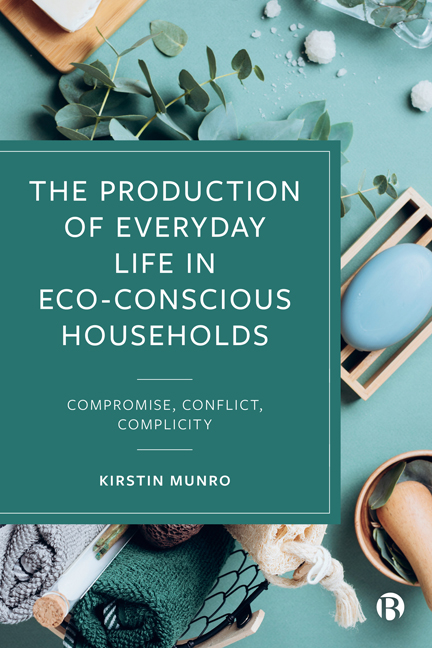Book contents
- Frontmatter
- Dedication
- Contents
- Acknowledgments
- 1 Introduction: “This Can’t Be All Up to Me”
- 2 Eco-Conscious Household Production and Capitalist Society
- 3 Priorities in Eco-Conscious Households
- 4 Resources and Constraints in Eco-Conscious Households
- 5 Managing Household Waste
- 6 Cleanliness and Comfort
- 7 Doing Their Own Research
- 8 Conflict
- 9 “How Do We Live with Ourselves?”
- 10 Conclusion: “We Have Met the Enemy and He Is Us”
- Notes
- Index
7 - Doing Their Own Research
Published online by Cambridge University Press: 18 January 2024
- Frontmatter
- Dedication
- Contents
- Acknowledgments
- 1 Introduction: “This Can’t Be All Up to Me”
- 2 Eco-Conscious Household Production and Capitalist Society
- 3 Priorities in Eco-Conscious Households
- 4 Resources and Constraints in Eco-Conscious Households
- 5 Managing Household Waste
- 6 Cleanliness and Comfort
- 7 Doing Their Own Research
- 8 Conflict
- 9 “How Do We Live with Ourselves?”
- 10 Conclusion: “We Have Met the Enemy and He Is Us”
- Notes
- Index
Summary
None of my informants grew up exactly the same way that they live now, so many of them had to spend considerable amounts of time and effort to learn about sustainability and new sustainable ways of getting things done in everyday life. They talk to friends and family members, they read books and websites, and they learn on the job as part of their waged work to gain practical know-how and to acquire information that helps them make more environmental choices. These efforts might be called “human capital acquisition” in the jargon of neoclassical economics—investments in productivity-enhancing skills that involved a trade-off to acquire. In other words, my informants’ research represents time—and in some cases, also money—that could have been used for some other purpose but that was dedicated to gaining skills and knowledge. Or, these efforts might be seen as gaining “competence” in theories of social practice—“which encompasses skill, know-how, and technique” (Shove, Pantzar, & Watson 2012, 14). And these efforts to acquire know-how that is useful for bringing everyday life into alignment with pro-environmental values can be thought of as one component of the unwaged work that takes place in these eco-conscious households—an input into the household production process.
In the time since these interviews were conducted, the concept of “doing one's own research” became associated during the COVID-19 pandemic with skeptics organizing anti-mask rallies, refusing vaccines, and taking unproven treatments or preventatives such as medications formulated for livestock. The phrase now appears with the word “research” in quotation marks in internet memes, such as “2021: I did my own ‘research’ “ engraved on a gravestone, or “You keep using this word ‘research.’ I don't think it means what you think it means,” featuring a photo of Mandy Patinkin as Inigo Montoya from the 1987 movie The Princess Bride. Today, “doing one's own research” is a position that is contrasted unfavorably by critics of these conspiracy theorists with scientists who do “real” research.
Many of my informants do not see “science” as neutral, and they do not trust the government, scientists, or the medical establishment to produce research or recommendations that promote environmental preservation or the safety of their families.
- Type
- Chapter
- Information
- The Production of Everyday Life in Eco-Conscious HouseholdsCompromise, Conflict, Complicity, pp. 121 - 136Publisher: Bristol University PressPrint publication year: 2023

